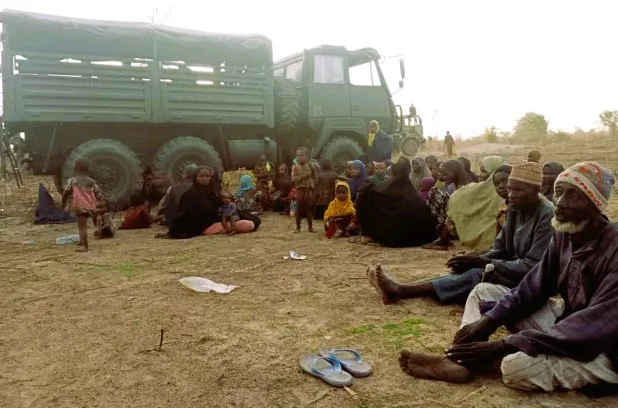In a significant and heroic effort, the Nigerian Army has successfully rescued 386 civilians, mostly women and children, from the Sambisa Forest. These civilians had been held captive for ten long years. The operation, led by Brigadier General AGL Haruna, Acting General Officer Commanding (GOC) of the 7 Division, was part of a larger mission to eradicate the remnants of terrorist groups in the region. The rescue mission, dubbed "Operation Desert Sanity 111," spanned 10 days and involved various army brigades and special forces units.
Brig. Gen. Haruna addressed newsmen at the outskirts of Sambisa Forest in Konduga Local Government Area (LGA). He shared the details of the operation, explaining its dual objectives: to clear the forest of any remaining terrorists and to provide an opportunity for those willing to surrender. The operation was meticulously planned and executed by a combined force of troops from the 21 Special Armoured Brigade, 26 Task Force Brigade, and 199 Special Forces.
The operation aimed to dismantle terrorist camps and strongholds in Sambisa Forest, a known hideout for various terrorist factions. The forest has been a battleground for years, with numerous military operations attempting to liberate the area from insurgent control. "Operation Desert Sanity 111" was the latest in these efforts, with a focus on achieving lasting peace and security in the region.
The troops faced numerous challenges during the operation, including difficult terrain and the constant threat of ambushes by terrorists. However, the Nigerian Army's well-coordinated strategy and the bravery of its soldiers ensured the mission's success. Brig. Gen. Haruna praised the troops for their professionalism and dedication, which were crucial in overcoming these obstacles.
The operation involved clearing out terrorist camps, dismantling makeshift structures, and securing the area to prevent reoccupation by insurgents. The soldiers moved systematically through the forest, ensuring no area was left unchecked. This thorough approach was essential in rescuing the captives and minimizing casualties.
The rescued civilians were in a state of relief and disbelief as they recounted their decade-long ordeal. Many of them had lost hope of ever being freed. Their stories are harrowing, highlighting the brutal conditions they endured while in captivity. The captives included women who were forced into marriage, children born in captivity, and individuals who had been subjected to various forms of abuse and hardship.
Brig. Gen. Haruna stated, “Our effort is to ensure that we clear remnants of terrorists in the Sambisa and give those willing to surrender the opportunity to surrender. With this operation, we envisage many of them will surrender as they have started. We also rescued some civilians; as of yesterday, we rescued 386 and I am sure the number will increase by today.”
The GOC also relayed the Chief of Army Staff's message to the troops, commending their exemplary performance during the operation. He emphasized the importance of sustaining the momentum to ensure the region remains secure and free from terrorist activities.
Among the rescued individuals were people who had spent ten years in captivity. Their stories reflect immense suffering and resilience. One of the rescued women shared her experience, saying, “We were taken from our homes and forced to live in constant fear. Many of us lost family members and friends. It feels like a miracle to be free again.”
A young boy, born in captivity, expressed his mixed emotions, saying, “I have never known what it means to be free. I am happy but also scared of what comes next. I hope we can go back to a normal life.”
These personal accounts underline the human cost of terrorism and the importance of military operations aimed at rescuing and rehabilitating captives.
The Nigerian Army's efforts do not end with the rescue. There are plans to provide medical care, psychological support, and rehabilitation for the rescued civilians. Many of them will need time and support to heal from their traumatic experiences. The government and various non-governmental organizations (NGOs) are expected to play a significant role in this process.
Additionally, the Nigerian Army continues to monitor and secure the Sambisa Forest and surrounding areas to prevent any resurgence of terrorist activities. The army's strategy involves not only military action but also community engagement and support to ensure long-term peace and stability.
The rescue operation has garnered positive reactions both locally and internationally. Many have praised the Nigerian Army for their bravery and commitment to rescuing civilians from terrorist captivity. Human rights organizations have highlighted the importance of such operations in protecting vulnerable populations and restoring their rights and dignity.
Locally, there is a sense of relief and gratitude towards the army. Communities affected by terrorism have renewed hope that peace and normalcy can be restored. The rescued individuals and their families are particularly grateful for the army's efforts, which have brought an end to their years of suffering.
The rescue of 386 civilians from Sambisa Forest is a significant achievement for the Nigerian Army and a step towards restoring peace and security in the region. The operation highlights the dedication and bravery of the Nigerian soldiers and the resilience of the rescued individuals. While challenges remain, this successful mission brings hope for a future where terrorism is eradicated, and affected communities can rebuild their lives.














0 Comments
Post your comment here